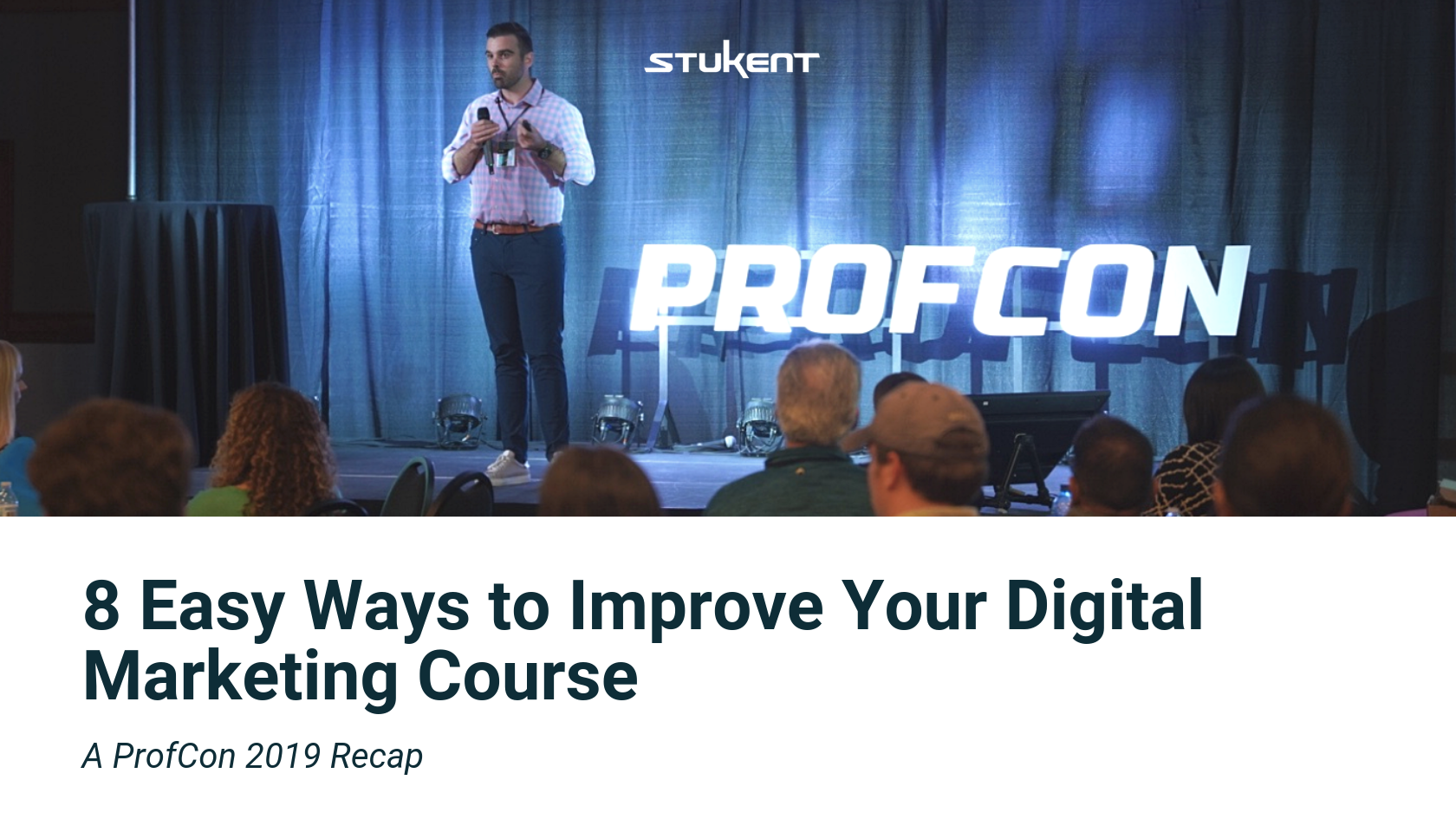Learn. Prepare. Share.
Marketing professors and professionals from all across the country traveled to Yellowstone National Park for Stukent’s first-ever ProfCon to enjoy three days of presentations, networking, and sight-seeing.

Attendees heard from 21 digital marketing professionals and professors, including representatives from Google, Facebook, GoDaddy, Get Found First, and the Van Duyse Entrepreneurial Leadership Institute (VELI). In fact, Stukent founder and CEO Stuart Draper, pledged to donate $20,000 to VELI to help future leaders.
Draper announced the release of a new simulation: Mimic Analytics, available in the fall of 2019. Mimic Analytics teaches students how to extract and transform big data in the cloud, use major programming languages, implement A/B tests, and much more. Request free instructor access to Mimic Analytics and be the first to try it out in the fall of 2019.
On top of that, he announced an all-new influencer marketing update to the Mimic Social simulation. The update allows students to strategize influencer marketing efforts and engage in dynamic contract negotiations. Request free instructor access to Mimic Social to see the updates for yourself.
Top 8 Actionable Takeaways From ProfCon 2019
ProfCon 2019 was full of current tips and tricks for teaching digital marketing in an ever-changing educational landscape. Below you can find eight of the best takeaways from ProfCon 2019.
1. Over-plan for Large Classes
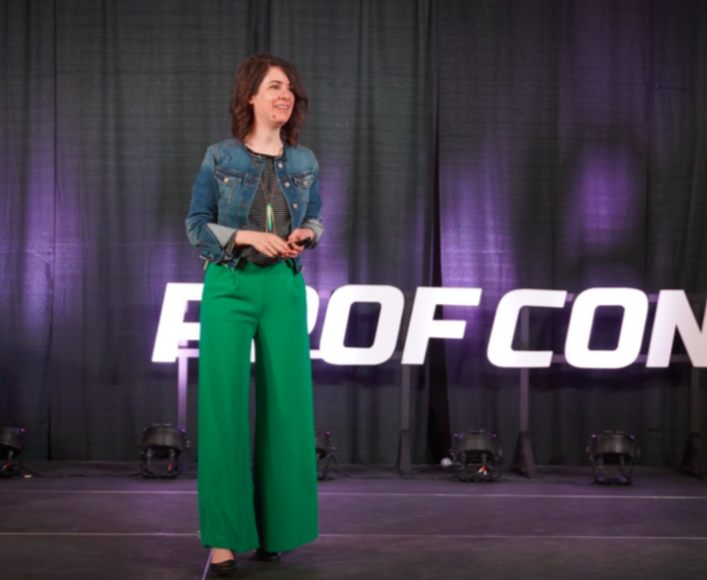
Kinda Wilson is a marketing professor at Oklahoma State University. She shared tips for increasing student engagement in her presentation: “Creating Classroom Engagement: Designing Interactive learning Experiences in All Class Sizes”
Wilson discussed what she learned while designing marketing courses at her university. She knew she needed to create interactive lessons that would work for all sorts of classes. So she built courses around a case study model and incorporated lesson structures that fostered multiple forms of engagement. She used the case studies to reiterate core concepts of marketing and to create structure for her students.
“By the end of the semester, we’d gone over it [the core concepts] so much, they almost didn’t have to study some of that stuff for the exam,” she said. “If you keep doing something, it becomes a part of the class environment and culture.”
Wilson said, the larger the class size, the more necessary it is to create a thorough lesson plan. She said you lose your students when “you’re not sure what you’re doing in between…”
Wilson provided several tips for increasing engagement in all sorts of class sizes:
- Create as much structure as you can without controlling your students
- Over-plan for large classes
- Use visual and audio cues to guide your students
- Promote communication between students
- Use countdowns during timed activities
- Acknowledge successes
2. Load Up Your Students’ Resumes
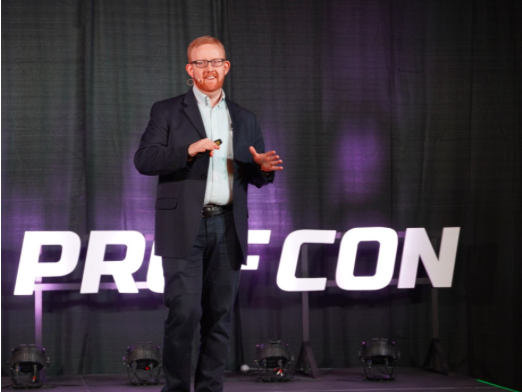
Scott Cowley is an award-winning innovator in digital marketing education. He is an assistant professor of marketing at Western Michigan University. Cowley provided secrets for building the most in-demand course at your school: “CX For the Most Popular Course in the Business School.”
He said, “If our students aren’t convinced that we’re teaching them something relevant, they’re going to tune out really, really fast. But, if they can tell that what you’re teaching is something they’re going to be able to use, they’ll respect it.”
To promote a prime customer experience for his students, Cowley surveys his past and current students to personalize his course and integrate industry trends. He says a successful course is one that gives students marketable experience.
In comparison to assigning theoretical classwork, “It’s so much better to teach them something that’s got a real world audience…” he said. This allows them to see real success and understand real processes.
Cowley provided several tips for creating a positive customer experience for your students:
- Use job postings to determine what skills your students need
- Encourage students to complete digital marketing certifications
- Require students to take part in creative projects that incorporate real clients
- Thank your students and reinforce them
- Connect with your students on social media
- Add flavor to your communication – personalize your courses
- Create inside jokes to brand your classroom experience
3. Give Your Students Control
Jeff Larson, a digital marketing and analytics professor at Brigham Young University, shared tips for understanding the nitty-gritty details of running a Google AdWords campaign in his presentation: “Setting Up Google Search Ads.”
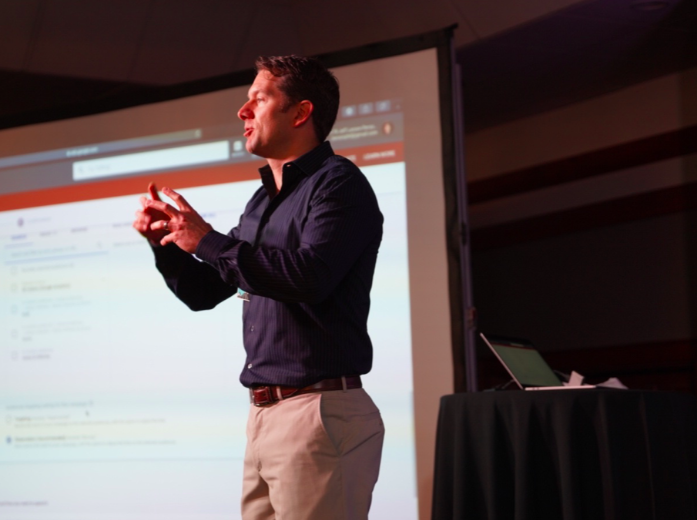
Larson shared the ins and outs of providing students real experience with Google Search Ads and suggested that teachers require students to work with actual clients whose websites need improved SEO.
He discussed the need for giving students full control of a website in which they are able to make executive decisions and practice autonomy.
Then, they have actual experience to put on their resumes.
Larson suggested that an effective Google Search Ads project requires students to do things like:
- Determine valuable keywords
- Budget for a campaign
- Track website interactions and conversions
- Find and track KPIs
- Run A/B tests on ads
4. Keep it Real
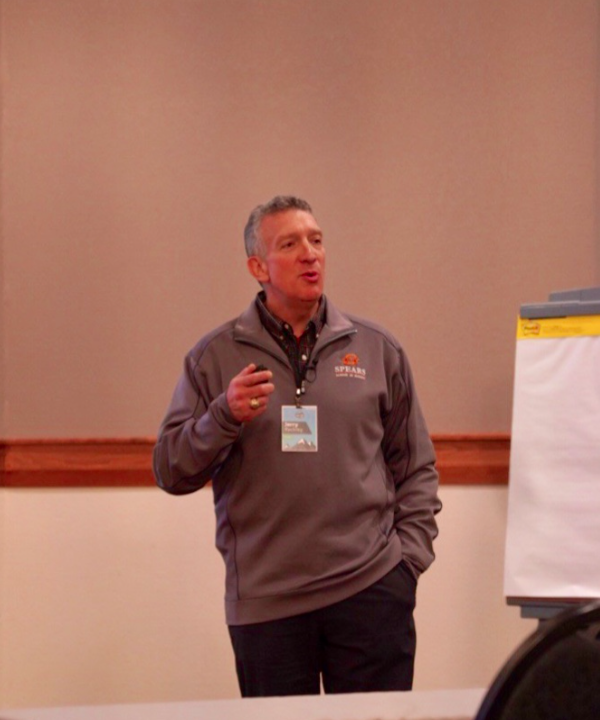
Jerry Rackley is an executive-in-residence at Oklahoma State University. He explained how to give students real-world understanding of digital marketing in his presentation: “Our Journey to Develop Digital Marketing.”
Rackley surveyed past students to determine what he should be teaching in his digital marketing classes. He found that although most students are regular social media users, “The students who have made it out there in the business world understood it’s a little bit different when you’re doing it for a business.”
He suggests that professors look to the real world of marketing to build their courses. By taking his own advice, he found that, “Digital marketing is a practical, real-world class for us. Students love the applied nature of the course, and employers value the relevant experience the students gain.”
He provided several suggestions for teaching digital marketing:
- Don’t stop lecturing – students need a basic understanding of the terms you’re teaching
- Teach analytics
- Require students to use email
- Use simulations
- Provide opportunities for healthy competition
- Give students feedback and coaching
- Teach students how to create solid content
Rackley explained that a detailed marketing campaign is very important but creating valuable content is equally necessary. Powerful content drives marketing strategies. He reminded professors that students must be able to create content in order to be successful digital marketers.
5. Connect Your Students’ to Their Future

Brennan Davis is an associate professor of marketing at California Polytechnic State University. He provided insights on marketing analytics in his presentation: “How to Teach Marketing Analytics for Student Career Readiness.”
Davis highlighted the differences between marketing analytics and market research: Marketing analytics deals with secondary data, both structured and unstructured, while market research is focused more on qualitative research like surveys and focus groups.
He provided specific strategies for teaching marketing analytics:
- Teach marketing analytics as data analytics for marketing
- Focus on the essentials of marketing
- Teach industry tools
- Require tool activities for learn-by-doing
- Show students what’s going on in the world of data
- Introduce basic analytics tools first
- Tie marketing concepts to marketing analytics
By implementing these strategies, Davis said, “I have my students revving their engines about marketing analytics when I put them in the driver’s seat with amazing tools and real-world problems to solve, instead of just teaching them boring formulas and processes.”
6. Stay Passionate
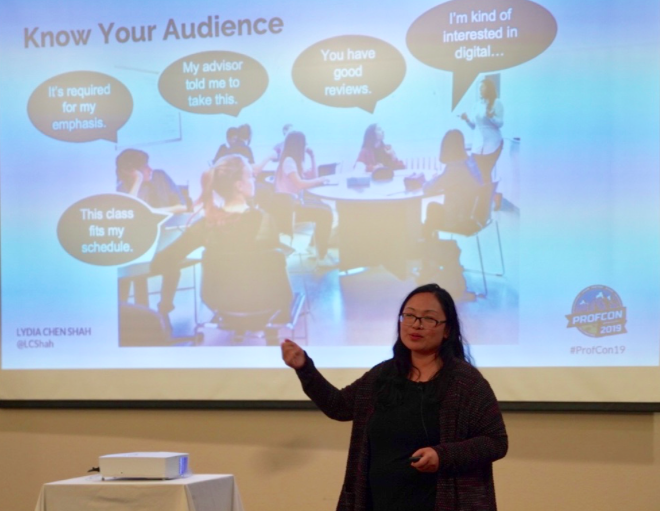
Lydia Chen Shah, a professor at California State University–Pomona, shed some light on bridging the gap between the classroom and the professional world in her presentation: “Bringing Professional Context to the Classroom.”
Chen Shah made a unique connection between instructors, students, and employers. She said they all want to be a part of success stories. All three groups want to be successful, but at the same time, they each have different responsibilities.
She suggested teaching students skills that professionals are looking for in new hires.
“What we instill in them and how we work with them, what we show them: It’s about building them as professionals,” she said. “They have the character development where they are creating these positive powerful reputations no matter what stage they are in their career.”
She also said that, like students, professors must practice their art in order to stay current with the industry. To be successful in any marketing environment, one must constantly be on top of the latest trends.
“Marketing is not for the faint of heart,” she said. “Digital takes it to another level.”
Chen Shah suggests that instructors, practitioners, and students alike remain curious and passionate about their art.
7. Encourage Engagement and Participation
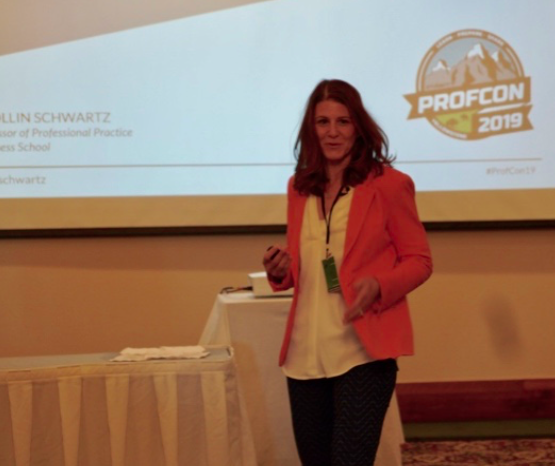
Stacy Schwartz, an award-winning marketing professor at Rutgers Business School, explained the keys for building a truly participatory online marketing course in her presentation: “Teaching Online Online: 10 Tips to Boost Student Engagement in Your Online Digital Marketing Courses.”
“We know that engagement in any sort of teaching environment is absolutely necessary for learning,” she said.
Schwartz suggested that engagement is key because it:
- Increases student satisfaction
- Enhances motivation to learn
- Reduces sense of isolation
- Improves performance
She mentioned achieving each of these goals of engagement is difficult to do in an online environment because you do not get to interact with your students in person. But, she provided 10 tips for increasing engagement in an online course:
- Keep classes small (20-26 students)
- Overcome pre-existing barriers
- Create a highly supportive environment
- Leverage the familiar
- Develop meaningful assignments
- Foster team-based problem-solving
- Demonstrate industry relevance
- Create milestones throughout the program
- Offer opportunities for students to teach each other and to be accountable to one another
- Use digital usability best practices to deliver your course content
Schwartz suggested that instructors connect with their students in the same ways digital marketers connect with their customers.
8. Be Human
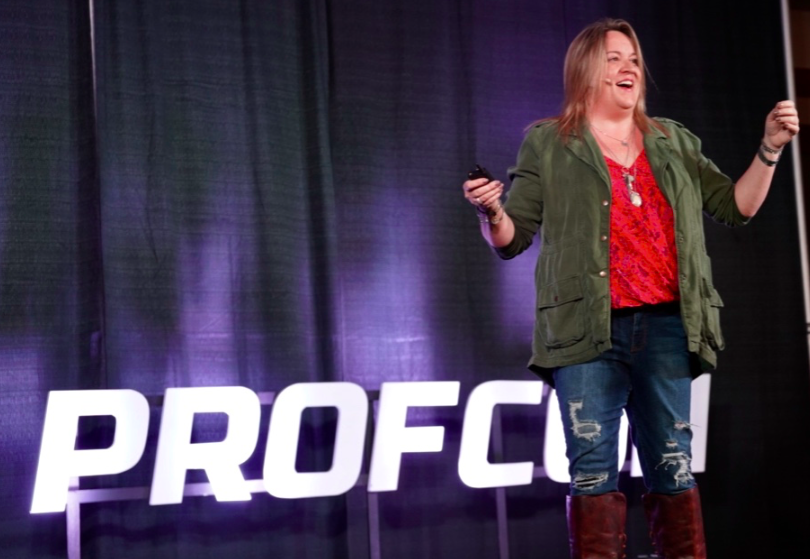
Heather Dopson is a marketing, social operations, and community engagement expert at GoDaddy. She provided secrets for understanding the Facebook algorithm in her presentation: “The Evolution of the Facebook Algorithm and Why it Matters to Marketers.”
Dopson began her presentation with a powerful statement:“There is no doubt that Facebook is important … Currently, there is no more powerful marketing platform than Facebook.” Because Facebook is such a powerful resource, Dopson says every digital marketer should understand it’s algorithm and use it.
She explained that the Facebook algorithm seeks to create meaningful connections for users. “Average people don’t understand algorithms,” she said. “But they’re more likely to find advice from an algorithm than a human being.” For this reason, marketers should focus on creating genuine, valuable content that does more than advertise.
Dopson said the Facebook algorithm has become more active by tracking:
- Shared posts
- Posts shared on Messenger
- Conversations within the replies of a post
- Post reactions
- Live video and video in general
- Originality of content
“People have an attention span for what they’re interested in,” Dopson said. “So as marketers, it’s our responsibility to make sure that we’re creating the stuff that people are interested in.”
Her number one tip was to be human, to create content that speaks to humans.
She provided a handful of tools you can use to become a better marketer:
Transform Your Course at ProfCon 2020
These eight tips provide unique insight into the constantly-changing world of digital marketing. From presentations on marketing analytics to Facebook algorithms, there is no other digital marketing conference that covers such valuable industry insight.

In case you missed ProfCon 2019, don’t worry. You can still register for ProfCon 2020 in Las Vegas.
Save your place at ProfCon 2020, so you can power-up your course with the latest trends in digital marketing.
Register now, so you can be on the cutting-edge of the latest trends in digital marketing. And don’t forget to use #profcon20 to join in the excitement for ProfCon 2020.
Join the ProfCon 2020 Facebook group to connect with fellow attendees and keep up with conference news.
